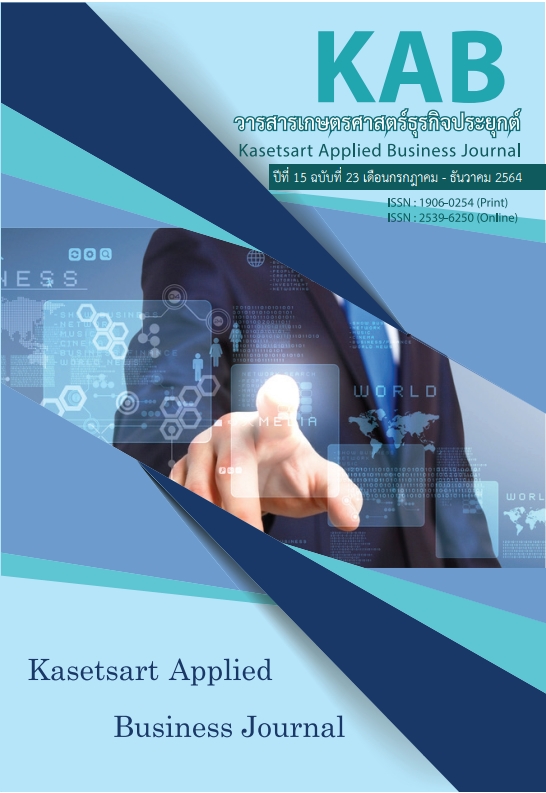กลยุทธ์การฟื้นฟูการให้บริการธุรกิจร้านอาหารที่ส่งผลต่อความพึงพอใจในบริการ และความเชื่อมั่นในตราสินค้าในภาวะวิกฤติโควิด-19 ของประเทศไทย
Main Article Content
บทคัดย่อ
การวิจัยครั้งนี้มีวัตถุประสงค์เพื่อศึกษากลยุทธ์การฟื้นฟูการให้บริการที่ส่งผลต่อความพึงพอใจในบริการ กลยุทธ์การฟื้นฟูการให้บริการที่ส่งผลต่อความเชื่อมั่นในตราสินค้า และความพึงพอใจในบริการที่ส่งผลต่อความเชื่อมั่นในตราสินค้าของธุรกิจร้านอาหารในภาวะวิกฤติโควิด-19 ของประเทศไทย ด้วยการวิจัยเชิงปริมาณ โดยทำการเก็บแบบสอบถามคนไทยที่ซื้ออาหารออนไลน์จากร้านอาหารช่วงหลังจาก Shutdown Covid-19 จำนวน 400 ชุด สถิติที่ใช้ในการวิเคราะห์ข้อมูล ได้แก่ การวิเคราะห์การถดถอยพหุคูณ ผลการวิจัยพบว่า (1) กลยุทธ์การฟื้นฟูการให้บริการ คือ กลยุทธ์การกล่าวขอโทษ กลยุทธ์การให้คำอธิบาย กลยุทธ์การรับข้อร้องเรียน กลยุทธ์การให้พนักงานตัดสินใจแก้ปัญหา และกลยุทธ์การชดเชย ส่งผลต่อความพึงพอใจในบริการ (2) กลยุทธ์การฟื้นฟูการให้บริการ คือ กลยุทธ์การกล่าวขอโทษ และกลยุทธ์การให้พนักงานตัดสินใจแก้ปัญหา ส่งผลต่อความเชื่อมั่นในตราสินค้า และ (3) ความพึงพอใจในบริการ ด้านการส่งมอบบริการ และด้านการตอบสนองความต้องการของลูกค้า ส่งผลต่อความเชื่อมั่นในตราสินค้าของธุรกิจร้านอาหารในภาวะวิกฤติโควิด-19 ของประเทศไทย ดังนั้นธุรกิจร้านอาหารต้องใช้กลยุทธ์การฟื้นฟูการให้บริการ เพื่อให้ลูกค้าเกิดความพึงพอใจ และสร้างความเชื่อมั่นในตราสินค้า โดยเน้นความสำคัญของการส่งมอบบริการ พร้อมกับผสมผสานเทคโนโลยีกับการดำเนินงานของธุรกิจ
Article Details

อนุญาตภายใต้เงื่อนไข Creative Commons Attribution-NonCommercial-NoDerivatives 4.0 International License.
Journal of TCI is licensed under a Creative Commons Attribution-NonCommercial-NoDerivatives 4.0 International (CC BY-NC-ND 4.0) licence, unless otherwise stated. Please read our Policies page for more information...
เอกสารอ้างอิง
จิตตินันท์ นันทไพบูลย์. (2556). จิตวิทยาการบริการ. กรุงเทพฯ: บริษัท วี.พริ้นท์ (1991) จำกัด.
ฉัตยาพร เสมอใจ. (2551). การจัดการและการตลาดบริการ. กรุงเทพฯ: บริษัท ส.เอเชียเพรส (1989) จำากัด.
ต่อลาภ สมัครัตน์. (2562). ทำาความรู้จักร้านอาหาร 8 ประเภท พร้อม How to เลือกยังไง? ให้ร้านคุณได้ไปต่อ. ค้นจาก https://www. smartsme.co.th/content/216521
ธีรวุฒิ เอกะกุล. (2543). ระเบียบวิธีวิจัยทางพฤติกรรมศาสตร์และสังคมศาสตร์. อุบลราชธานี: สถาบันราชภัฏอุบลราชธานี.
นิศา ชัชกุล. (2557). อุตสาหกรรมการท่องเที่ยว (พิมพ์ครั้งที่ 5). กรุงเทพฯ: สำานักพิมพ์แห่งจุฬาลงกรณ์มหาวิทยาลัย.
ปราณ สุวรรณทัต. (2563). โควิด-19 สร้างวิกฤตความเชื่อมั่น คนไทยชะลอการใช้จ่ายเพราะไม่แน่ใจเรื่องเศรษฐกิจการเงิน. ค้นจาก https://brandinside.asia/thai-consumer-behavior-affect-from-covid-19
วัชรพจน์ ทรัพย์สงวนบุญ, เวทยา ใฝ่ใจดี และ ปรียากมล เอื้องอ้าย. (2563). การเปลี่ยนผ่านทางดิจิทัลเพื่อยกระดับความสามารถทางการแข่งขันองค์กร กรณีศึกษา ธุรกิจอาหารและเครื่องดื่ม. วารสารเกษตรศาสตร์ธุรกิจประยุกต์, 14(20), 25-44.
ศูนย์วิจัยกสิกรไทย. (2563). ความท้าทาย...หลังวิกฤติโควิดผลักดันธุรกิจร้านอาหารสู่ New Normal. ค้นจาก https://kasikornresearch.com/th/analysis/k-social-media/Pages/RestaurantFB-1505.aspx
อิสรีย์ ติยะพิพัฒน์. (2562). ประวัติและความเป็นมาของกิจการภัตตาคาร. ค้นจาก http://www.elfhs.ssru.ac.th/itsaree_ti/mod/resource/view.php?id=115
Aday, L. A., & Andersen, R. (1974). A frame work for the study of access to medical care. Health Serv Res, 9(3), 208-220.
Ahmed, S., & Hashim, S. (2018). The moderating effect of brand recovery on brand hate and desire for reconciliation: A PLS-MGA
approach. International Journal of Business and Society, 19(3), 833-850.
Bateson, J. E. G., & Hoffman, K. D. (2008). Services Marketing (4th ed.). Mason: South-Western.
Chinomona, E., & Maziriri, E. T. (2017). The influence of brand trust, brand familiarity and brand experience on brand attachment: A case of consumers in the Gauteng Province of South Africa. Journal of Economics and Behavioral Studies, 9(1), 69-81.
DeMers, J. (2018). How Brands Should Be Working to Fix the Consumer Trust Crisis.
Falkheimer, J., & Heide, M. (2015). Trust and brand recovery campaigns in crisis: Findus Nordic and the horsemeat scandal.
International Journal of Strategic Communication, 9(2), 134-147.
Fowler, F. J. (2014). Survey Research Methods (5 th ed.). California: Sage Publications.
Gecti, F., & Zengin, H. (2013). The relationship between brand trust, brand affect, attitudinal loyalty and behavioral loyalty: A field study towards sports shoe consumers in Turkey. International Journal of Marketing Studies, 5(2), 111-119.
Gursoy, D., & Chi, C. G. (2020). Effects of COVID-19 pandemic on hospitality industry: Review of the current situations and a research agenda. Journal of Hospitality Marketing and Management, 29(5), 527-529.
Jamal, A. (2020). Covid-19: Locked down shoppers turn to vegetables, shun ready meals, wasted less food. Retrieved from https://www.hindustantimes.com/more-lifestyle/covid-19-locked-down-shoppers-turn-to-vegetables-shun-ready-meals-wasted-less-food/story-qMqrQXajiGxseax3k4lMHP.html
Jin, N., Line, N. D., & Merkebu, J. (2016). The impact of brand prestige on trust, perceived risk, satisfaction, and loyalty in upscale restaurants. Journal of Hospitality Marketing and Management, 25(5), 523-546.
Kabadayi, E. T., & Alan, A. K. (2012). Brand trust and brand affect: their strategic importance on brand loyalty. Journal of Global Strategic Management, 6(1), 80-88.
Kim, J., & Lee, J. C. (2020). Effects of COVID-19 on preferences for private dining facilities in restaurants. Journal of Hospitality and Tourism Management, 45, 67-70.
Li, M., & Wei, H. (2016). How to save brand after crises? A literature review on brand crisis management American. Journal of Industrial and Business Management, 6, 89-96.
Rempel, J. K., Holmes, J. G., & Zanna, M. P. (1985). Trust in close relationships. Journal of Personality and Social Psychology, 49(1), 95-112.
Sahin, A., Zehir, C., & Kitapci, H. (2011). The effects of brand experiences, trust and satisfaction on building brand loyalty: Anempirical research on global brands. Procedia Social and Behavioral Sciences, 24, 1288-1301.
Sciarelli, M., Nagm, A. A., Dakrory, M., & Tani, M. (2017). Mediating service recovery satisfaction in the relationship between internet service recovery and customer loyalty. International Journal of Business and Management, 12(10), 24-42.
Semercioz, F., Pehlivan, C., Sozuer, A., & Mert, A. (2015). Crisis management practices and strategic responses through customer loyalty and price strategy in hard times: Evidence from fine-dining restaurants.Procedia Social and Behavioral Sciences, 207, 149-156.
Sinclair. (2020). Revival Strategies: COVID-19 Recovery Planning for Brands. Retrieved from https://www.sinclaircomms.com/wp-content/uploads/2020/03/Sinclair-Report-REVIVAL-STRATEGIES-COVID-19-Recovery-Planning-for-Brands.pdf
Tschohl, J. (2016). Customer Service Recovery for Hotels by Service Quality Institute. Retrieved from http://www.customer-service.com
Wirtz, J., & Lovelock, C. (2016). Services Marketing People Technology Strategy (8th ed.). Singapore: World Scientific Publication.
Yang, Y., Liu, H., & Chen, X. (2020). COVID-19 and restaurant demand: Early effects of the pandemic and stay-at-home orders” International. Journal of Contemporary Hospitality Management, 13(12): 3809-3834.
Yunus, Y., Ishak, S., & Rhouse, S. (2012). Critical service incidents: Analyzing service failure and recovery in hotels, restaurants and transportation in Malaysia. Journal of International Business and Economics, 5, 18-37.
Zehir, C., Sahin, A., Kitapci, H., & Ozsahin, M. (2011). The effects of brand communication and service quality in building brand loyalty through brand trust: The empirical research on global brands. Procedia Social and Behavioral Sciences, 24, 1218-1231.
Zeithaml. V. A., Bitner, M. J., & Gremler, D. D. (2009). Services Marketing: Integraing Customer Focus across the Firm (5th ed.). Singapore: McGrew-Hill.


